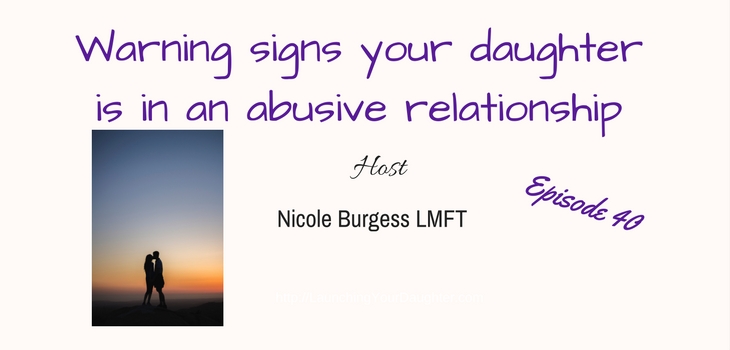
Today’s episode is about teen dating abuse and violence. I know this topic can be difficult to hear, but I am encouraging you to listen because unfortunately this continues to be an all to common issue I see in my practice. In the past I co-facilitated a domestic violence batterer’s intervention group for teen boys. They had been charged with being physically abusive toward a partner or family member or a person and were required to attend an either a 26 or 52 week program for perpetrators. The agency I worked at had a group for teen girls and two different groups for adult males and females.
In this episode you will learn:
- Statistics of teen dating abuse and violence
- Warning signs of possible abuse or violence in the relationship
- How to help your daughter
Statistics of teen dating violence
- 1 in 3 high school student experiences some form of dating violence (physical, sexual, emotional or verbal abuse) in their relationship
Love and Respect website states:
- Nearly 1.5 million high school students nationwide experience physical abuse from a dating partner in a single year.
- One in 10 high school students has been purposefully hit, slapped or physically hurt by a boyfriend or girlfriend.
- Girls and young women between the ages of 16 and 24 experience the highest rate of intimate partner violence — almost triple the national average.
- Among female victims of intimate partner violence, 94% of those age 16-19 and 70% of those age 20-24 were victimized by a current or former boyfriend or girlfriend.
- Violent behavior typically begins between the ages of 12 and 18.
- The severity of intimate partner violence is often greater in cases where the pattern of abuse was established in adolescence.
CDC (Centers for Disease Control and Prevention)
- Violence is related to certain risk factors. Risks of having unhealthy relationships increase for teens who —
- Believe that dating violence is acceptable
- Are depressed, anxious, or have other symptoms of trauma
- Display aggression towards peers or display other aggressive behaviors
- Use drugs or illegal substances
- Engage in early sexual activity and have multiple sexual partners
- Have a friend involved in dating violence
- Have conflicts with a partner
- Witness or experience violence in the home
- Dating violence can be prevented when teens, families, organizations, and communities work together to implement effective prevention strategies.
Warning signs of possible abuse
- Checking cell phones, emails or social networks without permission
- Extreme jealousy or insecurity
- Constant belittling or put-downs
- Explosive temper
- Isolation from family and friends
- Making false accusations
- Erratic mood swings
- Physically inflicting pain or hurt in any way
- Possessiveness
- Telling someone what to do
- Repeatedly pressuring someone to have sex
- Behavior change in daughter-more depressed or withdrawn, anxious or seems fearful
What parents and teens can do
- Listen without judgment
- Share your concern with your daughter about how she is being treated in her relationships
- Remind her it is not her fault and she doesn’t deserve to be treated that way
- Encourage her to create a code word or signal to let her friends know she is in danger
- Have a list of important phone numbers in your cell phone or with you at all times.
- Brainstorm what you can do or places you can go if your boyfriend becomes violent
- Tell friends or parents where you are going or what you may do when with boyfriend.
- Call 911 if you are in danger
- Write down what happens in a journal or notebook. (It may be important later on to keep a record of what is happening.)
- Get professional help-support groups for victims of violence, mental health counseling to work through the traumas and regain self-confidence
This podcast is also available on Stitcher, Google Play, YouTube and now iHeartRadio.
Resources Information: (Some maybe affiliate links)
RAINN: https://www.rainn.org/ 800-656-HOPE (4673)
National Domestic Violence Hotline 1-800-799-SAFE (7233) http://www.thehotline.org/
Teen Torment: Overcoming Verbal Abuse at Home and at School by Patricia Evans
[spp-optin]
